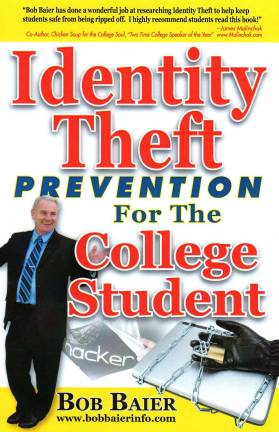The dark side of the Web

WARWICK Online Identity theft, including a recent increase in the targeting of children, is growing faster than ever.
Thats a message that, according to Warwick resident Bob Baier, needs to be brought to everyones attention.
Baier is a forensic document examiner who testifies in court regarding forgeries and trains law enforcement in Orange County in seven different areas, one of which is identity theft. He is also the author of Identity Theft Prevention for the College Student, a publication that offers practical and useful tips that everyone, especially students living away from home, should follow to stay safe.
Baier explained that every Web site you visit, every image you download and every e-mail you send, all connected to your IP address, can be an open invitation for identity thieves to invade your privacy. And according to the 2012 Child Identity Theft Report, children are 35 times more likely to be victims of identity theft than adults.
Were not home Thieves also love the fact that a childs social security number will have no credit history.
And keep in mind, said Baier, in many homes the children are using a parents computer, which is where sensitive information about banking and credit cards may be found.
The crooks can also obtain a wealth of information from social media like Facebook where people often list their home addresses and even travel reports and photos, which basically tell everyone Were not at home and were far away.
And file-sharing networks, commonly known as peer to peer, allow users the ability to download software that essentially opens their computer to other users looking to share information such as music and games. But they can also inadvertently expose the contents of entire hard drives including tax returns, passwords and important account numbers.
Youngsters, said Baier, who use file-sharing programs to download music free of charge on a parents computer are unknowingly helping the thieves.
Today, malicious sites throughout the world have more sophisticated technology than ever and can steal user names and passwords anywhere on earth.
10-digit passwords One extremely dangerous site is IDChief.com, a China-based web site, where underage people, often college students, can order very authentic looking but fake identity cards to purchase alcohol. But the unsuspecting teenagers, besides being subject to penalties, are also providing essential information for identity theft.
In addition to suspicion, vigilance and common sense, Baier suggests you change all of your passwords to at least 10 digits with upper and lower case letters, numbers and if allowed symbols such as an exclamation mark placed somewhere within the password and not at the end. And never use any part of your own first or last name, your mothers maiden name, your pets name, your school or school mascot.
One of the fastest growing crimes in the United States is Identity Theft and college students are easy marks.
Free program sheet In Identity Theft Prevention for the College Student, Baier explains the seven most important things you need to know to prevent Identity Theft. The information is especially helpful for college freshmen.
To receive a free 30-day program sheet outlining what should be done to help keep you safe from identity theft, the FBI latest scams, what to do if you become a victim or to order a copy of Baiers book go to www.bobbaierinfo.com and click on Identity Theft.
- Roger Gavan